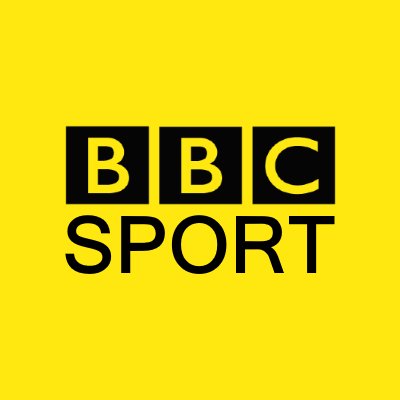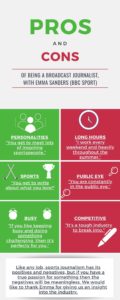Emma Sanders
Job title Broadcast Journalist
Employer BBC Sport

Have you ever wandered who has the joy of sitting at football matches and texting through live updates to the fans all around the world? That’s the job of Emma Sanders, a Broadcast Journalist.
Emma currently works for BBC Sport producing content for their news desk, social media and football departments. Emma spoke to us about her role at the BBC, what her day-to-day routine consists of and provides some brilliant advice to those trying to break into the industry.
“Delivering live content”
What is the role of a Broadcast journalist?
As a broadcast journalist I cover a range of sports for the BBC Sport website – delivering live content, news, features, interviews and social media content. I specialise in football and tennis. I cover Premier League, European top flight, international and women’s football.
“I sometimes cover three of four games simultaneously,”
What does a typical day involve as a Broadcast Journalist?
I specialise in live text coverage so my usual day-to-day role will be covering a Premier League game for the website in this format. It can run from anywhere between three and eight hours with the weekend coverage being a lot busier! I sometimes cover three or four games simultaneously, giving short commentary on the best bits, goals and talking points in the game. We interact with the readers and create discussion. I also write match reports, sort out player/manager interviews, write features, explore news line and occasionally attend press conferences.
What have the players from the WSL been up to during lockdown?
Let’s take a look ? https://t.co/njDgGsReoS pic.twitter.com/lzAP5Rn7hl
— BBC Sport (@BBCSport) 12 April 2020
“Communicate fluently”
What skills and knowledge do you need in your role as a Broadcast Journalist?
You need to be able to communicate fluently in order to build contacts in the industry. Also, it’s obviously key to demonstrate strong written and grammar skills and appreciate what the most newsworthy lines are.
Employability is a incredibly important when applying for all careers in sport. We recently spoke with Professor John Brewer who has specialist knowledge about improving employability, he spoke to us exclusively here.
“I have worked for BBC Sport for two years now,”
Tell us a bit about your career path to this point and your jobs in sports journalism
I studied journalism at the University of Salford before going freelance for two years, carrying out work experience at a number of national and regional publications. I have worked for BBC Sport for two years now, having previously covered Liverpool football news for several publications across Merseyside, including the Liverpool Echo newspaper.
“Always opportunities for work experience”
What opportunities are there in broadcast journalism in the UK for young people?
There are always opportunities for work experience and internships but it’s a hugely competitive industry. You need to be proactive and organise your own work experiences through communication and building contacts.
If you are looking for different opportunities to gain experience in sports journalism, workshops and job openings are great ways to find out more about the industry and gain experience. Why not check out our workshop and jobs sections to see what is available?
“Find something you specialise in.”
What advice would you tell young people looking for Broadcast Journalist jobs?
Keep working hard to get experience and try and find something you specialise in. Don’t say no to any opportunities and give everything a go until you find something you excel in.
“You get to write about what you love”
What are three great things about working in the sports media industry
- Personalities – get to meet lots of inspiring sportspeople
- Sports – you get to write about what you love
- Busy – if you like to keep busy and do something challenging, then it’s perfect for you
“It’s a tough industry to break into”
What are three challenging things about working in the sports media industry?
- Long hours – unsociable hours too as I work every weekend and heavily throughout the summer during major tournaments
- In the public eye – you are constantly in the public eye and it’s sometimes hard to separate work life with private life
- Very competitive – it’s a tough industry to break into

Being a Broadcast Journalist is an exciting, enjoyable and challenging job. We have lots more information on the site about how to become a Broadcast Journalist and also lots of others interviews with professionals in the sports industry, make sure you check them out here.

Careers in Sports Media webinar on our YouTube channel

NFTS offer a unique Sports Production professional diploma course – click here for more details.

